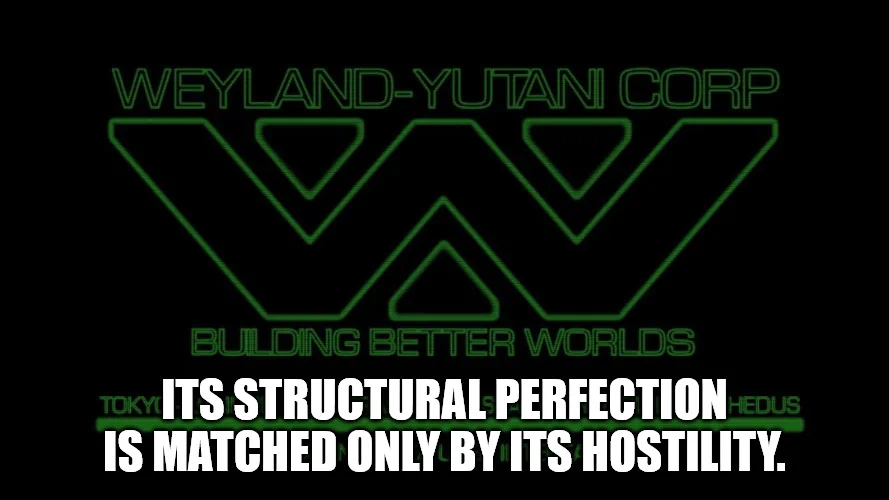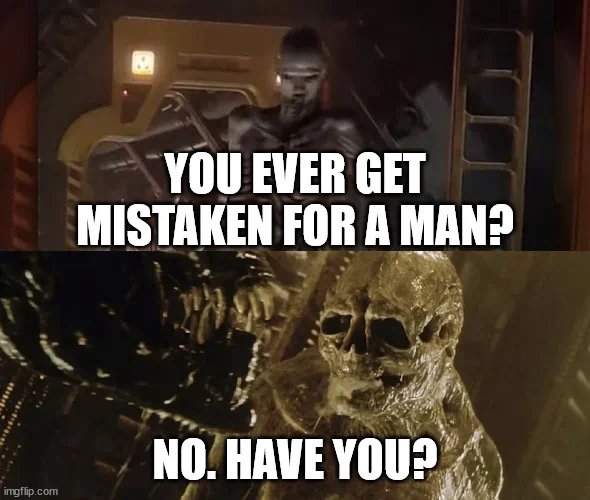
I’ve written before about the creative bankruptcy that fuels the Disney engine. Whether driven by cynicism or fear, it’s become clear that Disney won’t let any of its properties stand on their own legs. Instead, they need to be propped up by references, homages, allusions, self-awareness, or multiverses.
I grew up watching and loving the Alien movies, and have always enjoyed the installments that tried something new. A franchise doesn’t need to be a formula. It can be a framework. I was really looking forward to Alien: Romulus, despite all my instincts warning me to temper my expectations — instincts I should have listened to.
Spoilers ahead1, so reader beware.
Side Note on Criticism
There’s a lot of ways to approach critiquing a movie. You can talk about the craftsmanship, the screenwriting, its themes, the acting, production design, or just plain how it made you feel. Each is an equally valid form of criticism. The point is using that criticism, either through writing it or reading it, to gain a better understanding of the art you consume, and through that process enrich yourself or your life.2
Today I’m focusing partially on the thematic elements of these, but mostly on the meta-thematic.
Alien: Romulus and the Legacy Sequel

It must be an uphill battle making a sequel to a movie decades after the fact. Your audience is mostly people who cherish the old thing, who are possessive of it, who want to see it treated with care; and then there’s the newer crowd, who may or may not care at all, if they even know about the original well enough. There’s a spectrum of approaches to this. At one end, you have Mad Max: Fury Road, which just doesn’t care about what came before. At the other, you have The Force Awakens, which is just a worthless nugget of a movie once you strip away the nostalgia factor.
A lot of fans wanted to pretend Prometheus and Alien: Covenant don’t exist. That’s fine, although there’s still some interesting stuff in there. For all the questionable writing, there was a sense that Ridley Scott took back the reins to the franchise and said, “You know what? Never mind. I’m gonna do something else with this.”
Which, understandably, upset some folks.
So Alien: Romulus (from here just “Romulus”) had to clean the slate a little bit. It had to reassure people that they’re really here for an Alien movie. The marketing did its job well enough.
Imagine my delight during the first twenty minutes of the movie. We’re treated to a corporate hellscape where people live lives of indentured servitude to the Company, brought to the screen in a brilliantly realized production. You can see the care that went into the set, costume, and prop design here.3
Of course, there needs to be some tie-in to the original property; that’s a given. Best case, it’s nominal, simply an inciting incident that kicks off a new adventure that explores the world from new angles. Unfortunately, as we’ve seen with most Alien sequels, it doesn’t seem like subsequent filmmakers have been able to actually think up new angles from which to explore Alien. At least not since James Cameron.
But that’s fine. Familiar thrills can still be thrilling enough. As long as the craft on display is good enough, as long as you’re not reminded of better movies along way.
Wait…
Disney is Full of Soulless Ghouls

The worst sin of nostalgia sequels, and most modern comedy / movies in general, is the substitution of references for content. “Hey, remember this other thing? Remember how cool that was? Here, let me remind you.”
The back half of Romulus is rife with this garbage. From “homages” (Rain grimacing, turning to the side as the Alien looms over her, recreating that famous frame from Alien 3), to outright perversions of character in order to shoehorn groan-inducing one-liners. I could spend a paragraph ranting about Andy’s “Get away from her, you bitch” bit. But I won’t. Then there’s the Offspring, an echo of the reviled Newborn from Alien: Resurrection.
At this point we’re just running through Def Leppard’s Greatest Hits instead of hitting up the record store for something new.
It’s shameless, but to be expected. Taken once or twice, these really could be chalked up as homages, little Easter eggs for the diehard fans. When you’re barraged with them, a real sense of cynicism seeps in. Why would he say that? What’s the point of this image? Why the sudden musical cue that’s totally different from the rest of the score?
And then there’s Ash. Sorry, I meant Rook.
I’ll admit, it did seem like an interesting idea at first. It makes sense that spaceships from the era of Alien would also be manned by synthetics of the same model as Ash. And when they plugged in that half of a synthetic, and the camera moved behind him to face the (living) actors, and we saw only suggestions of features, draped in shadow, only the voice was an indication of who it was meant to be (or remind you of).
And that’s fine. Actors portray other actors, and other real life people, all the time.
But what point is there in resurrecting a dead actor’s likeness and slapping it, poorly and with CGI, over someone else’s face? And then give the character a different name, but have them behave the same as the original character, and even use the same lines for no apparent reason?
Sure, there are plenty of in-world explanations for this, but they’re all bullshit. The real explanation is that Disney thinks it owns the likenesses of every actor whose been in every movie they own, and no one in any position of power has any qualms about exploiting the dead for a momentary “oh, it’s that guy” reference.4
Alone, this incident would be gross, but as another point in Disney’s grand pattern, it’s outright ghoulish. Everyone involved in making this decision and approving it should be ashamed for a multitude of reasons.
Do any of these decisions contribute to the movie or enhance it in any way? Thematically, substantively, or other? No? Then why? Oh yeah, Star Wars has rotted the brains of the execs over there, and when someone tried to branch out a little with the Last Jedi, they didn’t like that the reception wasn’t purely sycophantic, so they reeled things in with Rise of Skywalker which made so much money they decided to take it to the bank and never look back on creatively risky decisions again.
Just do the thing you did before. That worked. That made money. Why bother trying something new?
It’s Like Poetry. It Rhymes.
In musical compositions there is this thing called a leitmotif. It’s often short and associated with a particular character, place, idea, etc.; you’ll hear them a lot in the work of composers like John Williams and Howard Shore. In fact, you could say the little musical cue when they discuss the black goo was the use of a leitmotif, although it was a little weird considering it’s the only audible use of one in the entire movie.5
In literature and other media, the analogue is a motif. This is a recurring pattern, usually of ideas but also sometimes of structure, theme, visual cues, etc. These are typically used to emphasize an idea, to provide a framework in which a particular idea can be challenged, prodded, explored.
In Jurassic Park, there is always man’s hubris, his belief in his own utter control, that is inevitably grabbed by the ankle and dashed against the rocks by his encounter with the dinosaurs.
One beautiful thing about the Alien franchise is that, while the aliens themselves were originally meant to symbolize one particular Thing, each movie approaches this with its own ideas and themes that challenge and are challenged by the Thing. While there are familiar motifs spread through each movie,6 each still has its own big idea to contend with.
I think, in the end, this ended up being my biggest gripe with Romulus. Pretty much every movie before this in the franchise came out of the gate with a wild swing for the fences, shooting for some Big Metaphor for Something. Then comes Romulus, who just stands there and says, “Wow, look at that form. Look at the way they swing. I should just do that.”
There’s some subtext in the movie, buried deep, if you really look for it. The name of the two halves of the space station, the story with the siblings, the “halves” of the franchise, etc., but this is all so meta and so barely hinted at that if you removed it entirely, the plot and themes on display would be completely unchanged.7 It is, therefore, extraneous. Gone are the grand ambitions, replaced only with the desire to entertain.
When a movie tries to enter a canon, it needs to fit somehow. Romulus thought by aping the visual and kinetic aspects of its forebears it could earn entry, but missed the fact that each of those actually aspired to something, successfully or not. So it took all the surface level stuff and left anything of substance behind. As empty as an echo.
- And some potentially spooky imagery if you don’t like the Xenomorph
- I feel like this point has been lost on people in recent times. I digress.
- Never mind that a lot of the characters are suspiciously young, which is kind of off compared to the original Alien’s weathered workman crew.
- They tried to use different actors for younger versions of characters in Han Solo and when that flopped, they took the wrong lessons.
- I could be wrong here, since other than that and near the beginning the music largely took a back seat.
- The AvP movies not being counted here
- It’s not too different from relying on a TV show to bridge the narrative gap between two movies (Marvel) or on comic books, novels, or TV to tell you just who a character is or why they matter in the first place (Star Wars).